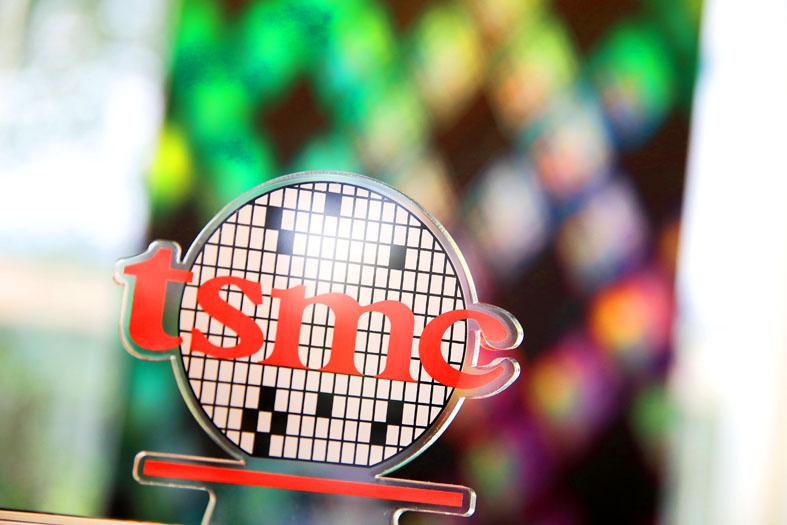The construction of a wafer fab in Japan to be run by a joint venture led by Taiwan Semiconductor Manufacturing Co (TSMC, 台積電) is to begin today.
Japan Advanced Semiconductor Manufacturing Inc (JASM), the joint venture, said that it signed an agreement with authorities in Kikuyo-machi in Japan’s Kumamoto Prefecture on Tuesday, with company president Yuichi Horita announcing the schedule for the new plant’s construction.
The plant is expected to begin shipping products in December 2024, Horita said.

Photo: Cheng I-Hwa, Bloomberg
In November last year, TSMC, the world’s largest contract chipmaker, said it would spend up to US$2.12 billion in equity investment on the wafer fab to establish a TSMC-majority-owned subsidiary to provide foundry services, with Sony Semiconductor Solutions Corp (SSS) taking a less than 20 percent stake in the new company.
In February, Japan’s Denso Corp said it would take an at least a 10 percent stake in the joint venture.
The plant would cover 72,000m2 and feature office buildings in addition to production lines, JASM said.
The company would move its headquarters from Kumamoto City to Kikuyo-machi once construction is completed, it said.
The plant would employ 1,700 people, including about 230 TSMC employees to be sent from Taiwan and about 200 from Sony Group Corp, which owns SSS, JASM said, adding that it would recruit about 1,200 workers.
TSMC dispatched the first group of 10 technology professionals from Taiwan last month, JASM said.

Sweeping policy changes under US Secretary of Health and Human Services Robert F. Kennedy Jr are having a chilling effect on vaccine makers as anti-vaccine rhetoric has turned into concrete changes in inoculation schedules and recommendations, investors and executives said. The administration of US President Donald Trump has in the past year upended vaccine recommendations, with the country last month ending its longstanding guidance that all children receive inoculations against flu, hepatitis A and other diseases. The unprecedented changes have led to diminished vaccine usage, hurt the investment case for some biotechs, and created a drag that would likely dent revenues and

Global semiconductor stocks advanced yesterday, as comments by Nvidia Corp chief executive officer Jensen Huang (黃仁勳) at Davos, Switzerland, helped reinforce investor enthusiasm for artificial intelligence (AI). Samsung Electronics Co gained as much as 5 percent to an all-time high, helping drive South Korea’s benchmark KOSPI above 5,000 for the first time. That came after the Philadelphia Semiconductor Index rose more than 3 percent to a fresh record on Wednesday, with a boost from Nvidia. The gains came amid broad risk-on trade after US President Donald Trump withdrew his threat of tariffs on some European nations over backing for Greenland. Huang further

CULPRITS: Factors that affected the slip included falling global crude oil prices, wait-and-see consumer attitudes due to US tariffs and a different Lunar New Year holiday schedule Taiwan’s retail sales ended a nine-year growth streak last year, slipping 0.2 percent from a year earlier as uncertainty over US tariff policies affected demand for durable goods, data released on Friday by the Ministry of Economic Affairs showed. Last year’s retail sales totaled NT$4.84 trillion (US$153.27 billion), down about NT$9.5 billion, or 0.2 percent, from 2024. Despite the decline, the figure was still the second-highest annual sales total on record. Ministry statistics department deputy head Chen Yu-fang (陳玉芳) said sales of cars, motorcycles and related products, which accounted for 17.4 percent of total retail rales last year, fell NT$68.1 billion, or

Macronix International Co (旺宏), the world’s biggest NOR flash memory supplier, yesterday said it would spend NT$22 billion (US$699.1 million) on capacity expansion this year to increase its production of mid-to-low-density memory chips as the world’s major memorychip suppliers are phasing out the market. The company said its planned capital expenditures are about 11 times higher than the NT$1.8 billion it spent on new facilities and equipment last year. A majority of this year’s outlay would be allocated to step up capacity of multi-level cell (MLC) NAND flash memory chips, which are used in embedded multimedia cards (eMMC), a managed